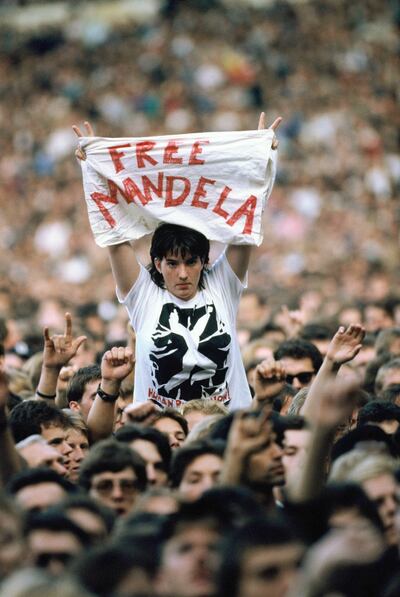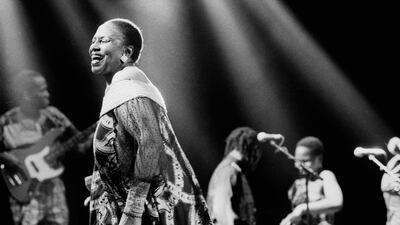Historically, music has played a mercurially potent role in fuelling the chimes of cultural change – particularly in eras of political strife. Where many may lack the will or means to slog through written polemical tracts, and filmmaking requires intensive temporal investment and resources, a timely rhyme and charged groove remains quicker to create, capture and disseminate – and infinitely simpler to understand.
At few times has music been mobilised with the same urgency as 20th-century South Africa, where the mounting anti-apartheid movement was mirrored in its own evolving soundtrack – tracing the arc of simmering resentment, violent revolt, subterfuge and joyous relief, which millions unjustly endured. So it was perhaps inevitable that, in seeking ever-new ways to tell the Nelson Mandela story – the closest thing we have to a real-life superhero tale, already evoked in a battalion of books and films – a stage musical would eventually be employed. After all, Mandela's own 630-page authorised autobiography Long Walk to Freedom once topped an (admittedly anecdotal) list of "books people buy but don't read".
Thankfully, this task fell to the Cape Town Opera, whose misleadingly named Mandela Trilogy – which begins a three-night run at Dubai Opera on Thursday – is in fact a one-night "folk opera" which mixes classical music sensibilities with elements of Broadway pizzazz and Xhosa tradition to honour the late Nobel Peace Prize laureate in song.
Director and librettist Michael Williams conceived three distinct chapters, each presented in three divergent musical styles, and played by three different actors portraying three conflicting sides of Mandela’s personality. Beginning in his teenage years, co-composer Péter Louis van Dijk uses Xhosa song and dance to conjure the rural, tribal upbringing of royally descended Mandela, played first in Dubai by Thato Machona.
Mike Campbell takes over scoring duties for the second chapter, which uses a mixture of township jive and Broadway jazz to recall Mandela's days as a Sophiatown lawyer, played here by Musanete Sakupwanya. Van Dijk takes back over for the solemn closing chapter – which ends in 1990 with Mandela's release after 27 years of unjust incarceration on Robben Island – switching to the sober tones of contemporary opera, sung by award-winning soloist Mandla Mndebele.
Initially conceived as a celebration of the leader's 92nd birthday, the cycle premiered on home soil three years before Mandela's death, during South Africa's 2010 Fifa World Cup, then titled African Songbook: A Tribute to the Life of Nelson Mandela. The rebranded Mandela Trilogy made an international premiere in Cardiff in 2012, before mounting an extensive tour of the United Kingdom last year – plus stops in Ireland and Italy – which met with largely enthusiastic reviews, hailed as an "inspirational journey" by The Independent. Augmented by the Cape Town Philharmonic Orchestra and Cape Town Opera Chorus, a week after the Dubai debut, the 60-strong cast head to the East Asia for the first time, closing Hong Kong's World Cultures Festival.
The musical powerfully parades Mandela's greatest legacy, peacefully abolishing the evils of apartheid and achieving racial reconciliation – but an equally interesting story is the role music itself played in that decades-long battle. The township tunes of the 1960s, struggle songs of the 1980s and liberation music of the 1990s are each invoked in the Mandela Trilogy score, with critics fittingly singling out the musical's jubilant use of Afropop staple Pata Pata – the signature tune of Miriam Makeba, who famously performed the song for the last time just seconds before suffering a fatal heart attack onstage in Italy in 2008, aged 76.
Makeba was just the most visible of a generation of South African performers whose music helped both inspire their countrymen to stand up to apartheid, and direct international attention to evils of the ruling Nationalist Party. She was to suffer for it, enduring 31 years of enforced exile.
Affectionately known as both Mama Africa and the Empress of African Song, Makeba captured the mood of discontent in the late 1950s with Sophiatown is Gone and Strike Vilakezi's Meadowlands, both visceral responses to the destruction in 1955 of the settlement renowned as a heartland of African jazz and creativity.
Following her exile in 1960, Makeba became a figurehead of the cultural boycott, and a celebrity in the West, tutored by Harry Belafonte on the early 1960s recordings – including Pata Pata and The Click Song – which came to define her career. Makeba's overt politicism became uncomfortable for some when she married Stokely Carmichael, the Trinidadian-American Black panther leader, in 1968, beginning a ten-year union with the political activist.
But it was a fleeting earlier marriage – Makeba's second of five – to fellow South African exile Hugh Masekela, which was to better define her career. The storied jazz trumpeter – who performs at Dubai Opera on March 8, a month before his 79th birthday – wrote a number of charged anti-apartheid songs, including Soweto Blues – a response to the 1976 Soweto uprising, which left hundreds dead – that would become a Makeba standard.
But these two flagbearers were far from the first South Africans to address the struggle in song – it was just the first time the West was listening. In the early 20th century, Church-grounded protest songs emerged from Ohlange Institute – founded in 1901 by John Dube, the future founding leader of the South African Native National Congress, which became the African National Congress that Mandela was to later lead – sung in Zulu to elude the understanding of white officials.
Facing ever more institutionalised discrimination following the establishment of apartheid in 1948, and the passing of the Population Registration Act two years later, musicians began explicitly addressing their oppressors with fiery protest anthems such as Izakunyathel'iAfrica Verwoerd – translated as "Africa is Going to Trample On You, Verwoerd" – a direct attack on the future prime minister Hendrik Verwoerd, widely considered the "architect of apartheid". The song would later be performed by Makeba and Afrika Bambaataa, while its composer Vuyisile Mini was later executed in 1964 after refusing to give evidence against fellow reactionaries.
Following the Sharpeville massacre of March 1960 – which saw 69 protesters killed by police – apartheid was intensified, and an ever-firmer fist greeted descent. While exiled artists such as Makeba, Masekela, Abdullah Ibrahim, Chris McGregor and Jonas Gwangwa mobilised international attention, in South Africa, a generation of young musicians grew up internally exiled by the ruling National Party's heinous relocation decrees – forced into bleak, newly created townships barren of entertainment, which became an unlikely hotbed of sound. While not directly political in nature, isolated but infused by imported sounds, thousands of youthful voices began cooking up distinctly Africanised spins on contemporary American forms. The eclectic Strut Records's excellent compilation series Next Stop Soweto celebrates thriving mbaqanga, soul/R&B/psych, jazz and Zulu rock/disco scenes of the 1960s to 1980s over four themed volumes.
While much of this music would be unheard by the outside world for decades, with sad inevitability, it was the works of international acts that are best remembered in the global consciousness of the apartheid struggle. Early statements came from American rapper-poet Gil-Scott Heron's Johannesburg (1975) and Peter Gabriel's Biko (1980) – a eulogy of South African activist Steve Biko – and by the mid-1980s numerous acts were mobilised to voice their disgust on record. The wave broke in 1984 with the upbeat singalong Free Nelson Mandela, by British ska band The Special AKA (later The Specials), which soon became a global anthem for the movement, kick-starting a wave of popular condemnation added to variously in coming years by Stevie Wonder (It's Wrong), Youssou N'Dour (Nelson Mandela) and Simple Minds (Mandela Day), while Steve Van Zandt mobilised dozens of celebrities – from Miles Davis to Bob Dylan – as Artists United Against Apartheid (Sun City).
Meanwhile, South African voices continued to sound with Maselka's domestic smash Bring Him Back Home (Nelson Mandela) – inspired by a letter smuggled out of prison from his friend Mandela – and Brenda Fassie's prophetic Black President.
The cresting wave reached shore with the Free Nelson Mandela Concert held at London’s Wembley Stadium in 1988 – co-organised by The Specials’s Jerry Dammers and Simple Mind’s Jim Kerr – marking Mandela’s 70th birthday and broadcast to an estimated 600 million people newly united in shaming the National Party’s reprehensible rule.

While it would be another 18 months before Mandela’s release – and a year more would pass before apartheid was officially abolished – there can be no doubt the role music played in South Africa’s long, sad fight for justice and equality.
Mandela Trilogy is at Dubai Opera from Thursday to Saturday at 8pm. Tickets are Dh250, visit www.dubaiopera.com
_______________
Read more:
Book review: Sound System voices the political power of song from a musician’s perspective
Grassroots musicians provide soundtracks for the revolution
_______________

